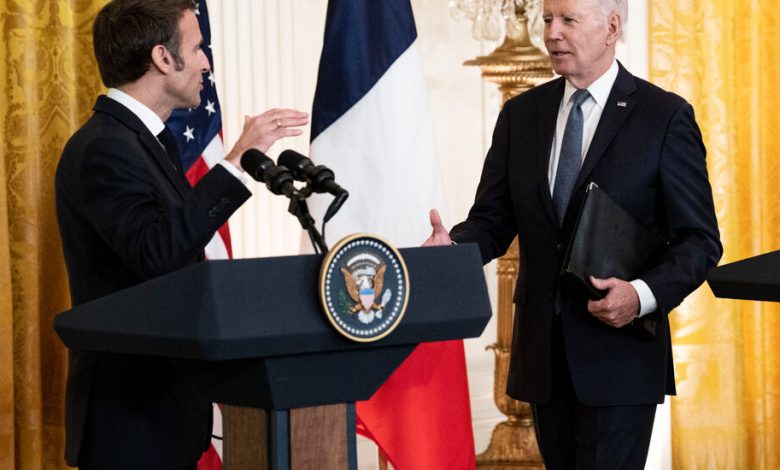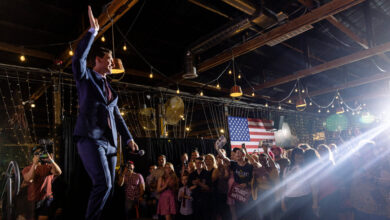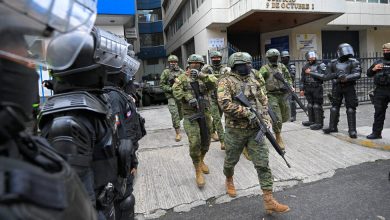Biden and Macron: A Bond Built on a Birthday Wish, Ice Cream and 30 Phone Calls

WASHINGTON — They shared an intimate double date, where the offerings included two scoops of ice cream. When they greeted each other outside the White House for a state visit on Thursday, the December chill had little effect, President Biden said, because “our hearts are warm.” President Emmanuel Macron of France returned the love by calling Mr. Biden “Cher Joe.”
Even for two reliably effusive leaders, this really was laying it on thick.
Mr. Biden told reporters the reason for hosting Mr. Macron for his first state visit as president was simple: “Because he’s my friend.” But there is strategy underneath all of that syrup. For all of the tools at an American president’s disposal, a state visit — which usually consists of a daylong diplomatic obstacle course followed by a lavish, let-loose dinner — is the one meant to test just how far flattery can get him with a key ally.
Though the two leaders spent Wednesday and Thursday making much of their friendship — and there is evidence that they are actually fond of each other — the friendly showing is going to test Mr. Biden’s ability to keep a key ally at his side as he pushes for an enduring hard line against President Vladimir V. Putin as Russia’s invasion of Ukraine continues.
For the moment, the time spent bonding appears to have worked: The two leaders, who have voiced different levels of interest in backing a negotiated end to the invasion, emerged from the Oval Office with an agreement to continue supporting Ukraine’s efforts to beat back Russian forces.
“We’re going to stand together against this brutality,” Mr. Biden said when the pair appeared before reporters.
On Thursday, they spent about 30 minutes together one on one, and then participated in a 90-minute bilateral session, according to a senior administration official, who spoke on the condition of anonymity to detail private interactions.
The official said that the rapport the two share is “genuine” and their bond has been forged by some 30 phone calls since Mr. Biden became president, multiple in-person interactions and warm correspondence — Mr. Macron sent a handwritten letter to wish Mr. Biden a happy 80th birthday.
Their appearance was a more unified — and ultimately more pragmatic — joint effort compared with Mr. Macron’s last state visit, when he was hosted by former President Donald J. Trump in 2018. During that visit, which at first appeared to be similarly heavy on the platitudes, the two men planted kisses on each other’s cheeks and held hands in front of photographers.
“I like him a lot,” Mr. Trump told reporters and officials looking on as the two gave each other a peck. In the Oval Office, Mr. Trump gently brushed what he said was dandruff off Mr. Macron’s shoulder. “We have to make him perfect,” Mr. Trump said. “He is perfect.”
Moments later, as they sat side by side, Mr. Macron placed his hand on Mr. Trump’s knee.
Theirs was not an enduring bond. As Gérard Araud, France’s former ambassador to the United States, recently said on Twitter, Mr. Macron focused on placating the president “because Trump is the most powerful guy on earth.”
“Most presidents tend to exaggerate the significance of personal relationships,” said Richard N. Haass, the president of the Council on Foreign Relations. “Personal connections can decrease the odds differences become crises — but all the personal chemistry in the world cannot turn differences into agreements.”
By contrast, Mr. Macron, 44, and Mr. Biden seem to enjoy each other. They saw each other only a few weeks ago, when both traveled to Bali, Indonesia, to attend the Group of 20 summit.
During one event, where they planted baby mangroves and toured a mangrove farm, the two stayed close to each other, talking intently as other leaders examined the plants. At one point, they were asked if they had any reaction to Mr. Trump announcing a run for the presidency in 2024. The two looked at each other and shared the faintest of smiles.
“No, not really,” Mr. Biden said, before they continued on their tour.
In September, when they met in New York on the sidelines of the General Assembly of the United Nations, their discussion, originally scheduled for 10 to 15 minutes, stretched to almost an hour.
The pair are not particularly opposed in their worldviews, but Mr. Macron and Mr. Biden have engaged in an explosive quarrel. There was the scuttling of a nuclear-powered submarine deal, which led France to pull its ambassador from Washington. (“Trust is like love; declarations are good, but proof is better,” Mr. Macron said last year when Mr. Biden admitted to committing an act of clumsy diplomacy.)
They also do not agree on Mr. Macron’s so-called strategic autonomy plan to make Europe less dependent on the American military, nor do they see eye to eye on Mr. Biden’s plans to offer preferential treatment to U.S. automakers that make electric vehicles.
And so there was perhaps a whiff of skepticism that Le Bromance could endure.
Toward the end of a news conference on Thursday, the two men were asked by a journalist about a common French saying, which translates roughly to “there is no love, only proofs of love.”
“Do you feel that your French friend will go home very much reassured?” the reporter asked.
Mr. Macron delivered a lengthy soliloquy in French, telling the reporter that love did not have as much to do with their agreements as strategy and clarity would going forward.
Mr. Biden’s response was more succinct: “I’m confident. That’s my answer.”





